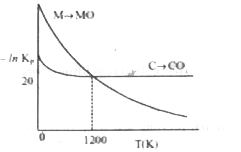At the sublimation temperature, for the process CO2(S)→CO2(g)
A
ΔH,ΔSandΔG are all positive
B
ΔH>0,ΔS>0andΔG<0
C
ΔH<0,ΔS>0andΔG<0
D
ΔH>0,ΔS>0andΔG=0
Video Solution
Text Solution
The correct Answer is:D
Since the process is at equilibrium ΔG=0 for ΔG=0, they should be ΔH>0,ΔS>0.
|
Topper's Solved these Questions
- THERMODYNAMICS AND THERMOCHEMISTRY BOOK - ERRORLESS CHAPTER - THERMODYNAMICS AND THERMOCHEMISTRY EXERCISE - Critical Thinking (Objective Questions)
63 Videos
- THERMODYNAMICS AND THERMOCHEMISTRY BOOK - ERRORLESS CHAPTER - THERMODYNAMICS AND THERMOCHEMISTRY EXERCISE - JEE section (Only one correct answer)
42 Videos
- THERMODYNAMICS AND THERMOCHEMISTRY BOOK - ERRORLESS CHAPTER - THERMODYNAMICS AND THERMOCHEMISTRY EXERCISE - ORDINARY THINKING (Objective Questions) Bond energy
15 Videos
- SOME BASIC CONCEPTS OF CHEMISTRYBOOK - ERRORLESS CHAPTER - SOME BASIC CONCEPTS OF CHEMISTRYEXERCISE - JEE Section (Matrix Match type questions)
3 Videos
Similar Questions
Knowledge Check
For the process CO2(s)→CO2(g)
ABoth ΔH and ΔS are positiveBΔH is negative and ΔS is positiveCΔH is positive and ΔS is negativeDBoth ΔH and ΔS are negativeAt the sublimation temperature, for the process CO2(S)→CO2(g)
AΔH,ΔSandΔG are all positiveBΔH>0,ΔS>0andΔG<0CΔH<0,ΔS>0andΔG<0DΔH>0,ΔS>0andΔG=0At the sublimation temperature, for the process CO2(S)→CO2(g)
AΔH,ΔS andΔG are all positiveBΔH>0,ΔS>0 and ΔG<0CΔH<0,ΔS>0 and ΔG<0DΔH>0,ΔS>0 andΔG=0
For the process CO2(s)→CO2(g)
View SolutionFor the process
Dry ice→CO2(g)
View SolutionFor the process
Dry ice→CO2(g)
View SolutionEquilibrium constant for the following reactions have been determined at 823K.
CaO(s)+H2(g)⇔CO(s)+H2O(g)K1=60
CaO(s)+CO(g)⇔CO(S)+CO2(g)K2=400
Using this information, calculate, equilibrium constant (at the same temperature) for :− CO2(g)+H2(g)⇔CO(s)+H2O(g)K3=?
CO(g)+H2O(g)⇔CO2(g)+H2(g)K4=?
View SolutionThe plot shows the variation of −InKp versus temperature for the two reactions.
M(s)+12O2(g)→MO(s)andC(s)+12O2(g)→CO(s)

Identify the correct statement :
View Solution
